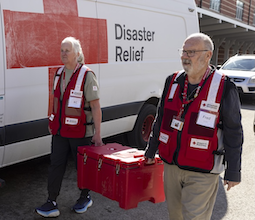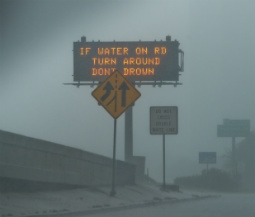A Red Crosser for more than two decades, Dave Dunn was a New Yorker living in the city in September 2001.
Immediately after 9/11, he first tried to give blood, and then, like many residents in the days following, he found himself standing in line to sign up as a volunteer with a number of agencies. Many were searching for iron workers and health care professionals at the time, which didn’t match Dave’s skillsets.
So, he returned home and kept his eye on opportunities to lend a hand.
“One night, there was an ad for the Red Cross on TV, and it was like this light bulb went off in my head,” he recalled. “I was like, ‘the Red Cross, of course!’”
He became a Red Cross volunteer soon after and was assigned to work in the Respite Centers at Ground Zero.
Later, he became a Disaster Action Team member for the Greater New York Region of the Red Cross, responding to home fires and other emergencies to provide support to those affected. As new opportunities presented themselves, Dave knew the Red Cross was an organization he eventually wanted to work for.
Though his heart was in it for the disaster and emergency response side of the Red Cross mission, Dave’s skills also matched up with those needed in building capacity within disaster services. Due to his background in training and development, facilitating workshops, and people management, he secured the next step in his Red Cross journey as director of disaster staffing and partner groups at his local chapter.
His first day on the job was “interesting”, as Dave describes it. It was September 2005, not long after Hurricane Katrina and its aftermath had devastated New Orleans.
“Our chapter was tasked with recruiting, training and deploying 3,000 volunteers to help by year’s end,” he said. “It was a major challenge, and we got through it together.”
While Dave served in this capacity, he was also working towards a long-time goal – to join the American Red Cross International Disaster Response Roster.
As part of the world's largest humanitarian network, the Red Cross maintains a roster of trained disaster responders in select priority technical areas.
Once Dave qualified and became a part of the roster in 2007, he was not called to respond internationally for a number of years.
When disaster strikes around the world, American Red Cross help is triggered by a request from the local Red Cross or Red Crescent team in the country affected and can take the form of people – deploying disaster experts in specific roles, like Dave – or financial contributions to a pooled Red Cross Movement funding source to support disaster response work.
It was November 2013 before the opportunity came up for him to deploy for a month to the Philippines to support the local Red Cross Society in response to Super Typhoon Haiyan. Dave formed a part of a specialized emergency relief unit.
After this first international deployment, Dave was hooked and has since deployed to support a number of response operations around the world.
In 2015, he was sent to a very remote district in eastern Nepal after a devastating earthquake affected the country.
“I was there by myself, and that was a real treat and a great learning opportunity because I was able to work directly with the district Red Cross leaders and shape some of their response efforts and their cash delivery systems,” he said.
In April 2022, Dave’s next deployment involved serving alongside the International Federation of the Red Cross and Red Crescent Societies (IFRC) onboard a ship called the Ocean Viking, which conducts rescue patrols in the Mediterranean Sea. While onboard, he engaged in four rescues, helping to save hundreds of people from flimsy, leaking rafts. All of the survivors, many of whom were unaccompanied minors, were suffering from dehydration and exposure.
“If we were not there in that moment, their lives would have been at risk,” he said. “These were very powerful moments for me.”
Vanuatu Earthquake Response
Fast forward to 2024, and Dave once again answered the call to support the global Red Cross Network following an international disaster.
On December 17, the island nation of Vanuatu was struck by a devastating 7.3 magnitude earthquake, which caused significant destruction, directly affecting an estimated 116,000 people -- about a third of the nation’s population. 14 lives were lost and 265 people were injured.
Vanuatu is an archipelago of more than 80 islands stretching over 1,300 km in the western part of the South Pacific Ocean, and the country experiences regular tectonic activity because of its proximity to an active zone where two tectonic plates meet and one slides beneath the other. It is also highly vulnerable to climate related disasters.
Since the earthquake, the Vanuatu Red Cross Society, alongside the IFRC and 14 International Disaster Response delegates from around the world, have been working tirelessly to provide support, funding and technical assistance to affected communities across the islands.
One of those 14 responders was Dave, who deployed to Vanuatu as a Developing Operations Manager for over two months. Dave said his mission was twofold – to find areas of the response and people he worked alongside that he could learn from, and to add value to the team and the response wherever he could.
“The role is about understanding all of the technical elements of a response and how to bridge all these elements together and then align them with what the host National Society wants to do, because ultimately it's their response,” he said. “It’s about asking the National Society, ‘what are your priorities and how can the Federation help you?’”
In each country and throughout each response, the needs are different, and Dave says the best managers can effectively work alongside local teams to figure out how to build systems and structures that stick, grow capacity, and ultimately benefit the local community.
Dave says the while being on assignment for two months can seem daunting initially, work progresses rapidly and the days fly by.
“One of the biggest challenges for us is making sure we’re also using our soft skills to listen attentively, to listen to actively understand -- to be able to read the room, to understand people so that we're able to communicate with them effectively in that short period of time we’re there to support the response,” he said.
It was in this spirit that Dave was tasked with supporting the Vanuatu Red Cross Society and the IFRC with volunteer development and hosting volunteer orientations, a tried-and-true area of expertise for him.
He also got out into the field during his deployment, going home-to-home to distribute relief supplies, conduct damage assessments and connect with residents to assess ongoing needs. It was a time-consuming and meaningful process to ensure individual needs were cared for in the most effective way possible.
Response efforts following the earthquake have reached 13,681 of some 50,000 targeted affected households so far, with support provided in the form of access to clean water, shelter and hygiene items, blood donations, cash and voucher assistance, and earthquake preparedness information and training. In addition, 43 international Restoring Family Links inquiries have been received, which have resulted in 29 reconnected families so far.
“Our goals come down to learning from each other and shaping our efforts to match the needs of the local Red Cross society and the community,” said Dave. “It comes down to three things – people, money and supplies. Those are the essentials of an operation, and the question is, ‘How do we align those three things so that they meet the long-term objectives of the response and recovery efforts?’ The idea is not necessarily go as a delegate and share what we know, but to learn as much as we can so that we can later help guide efforts with the resources we also have to share.”
Vanuatu’s resilience is tested time and again, yet its communities continue to demonstrate remarkable strength.
The island nation is continuing to recover from the impacts of the earthquake, and Red Cross teams are prioritizing both immediate and longer-term recovery efforts to targeted populations, such as multi-purpose cash grants, livelihoods grants and shelter training.

















